Playing our part
Providing vital equipment
More than £10,000 of medical safety equipment for frontline staff was donated by the University to the UK’s largest hospital trust.
The personal protective equipment (PPE) was collected from around the University and given to Manchester University NHS Foundation Trust, which runs Manchester Royal Infirmary and the NHS Nightingale Hospital North West based at Manchester Central conference complex among others.
Two types of disposable gloves, safety glasses and over glasses, aprons, sterile alcohol wipes, hospital gowns, face masks and spirometers were among the donated kit.
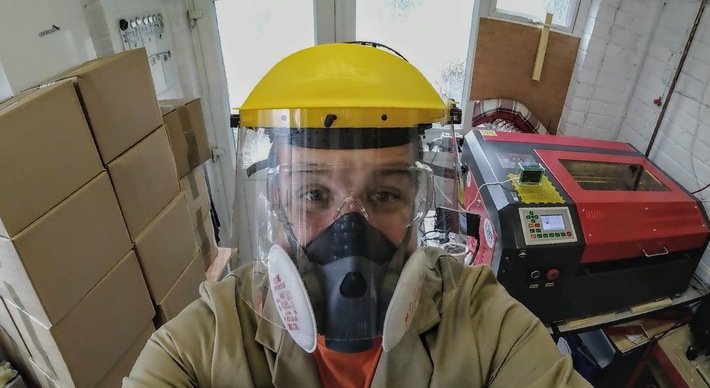
Academics from the University’s Department of Natural Sciences also donated boxes of gloves, overshoes and protective suits to NHS hospital staff.
Dr Ian Tidmarsh, Technical Services Business Partner at Manchester Metropolitan University, said: “In collaboration with academic colleagues, technical services teams from across three faculties facilitated the transfer critical PPE to the NHS. We are very proud of being able to support NHS frontline workers by donating over £10,000 of much needed supplies.”
Students on the frontline
More than 100 student nurses volunteered to join hospitals on paid work placements as the NHS dealt with a surge in COVID-19 patients.
They worked in hospitals for three to six months, during the height of the pressure on the health service from COVID-19, providing essential support for the stretched NHS.
The second and third-year students, from Manchester Metropolitan’s BSc (Hons) Nursing programme, all volunteered to take part, joining more than 20,000 student nurses and midwives who opted-in nationally.
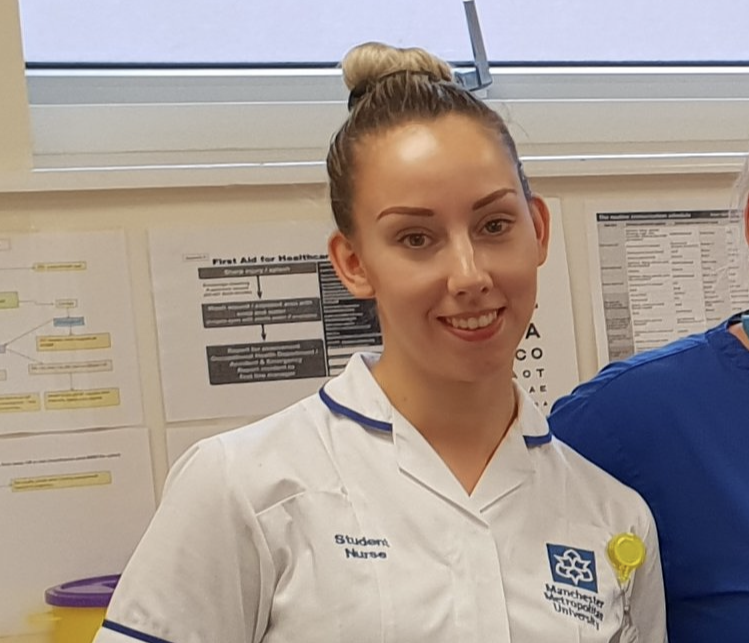
The University – which has a long history in training professional healthcare workers – modified its nursing degrees in light of COVID-19 so students could join hospitals and complete their courses as part of new national guidance on nursing training.
Lauren Ashworth, a third-year student nurse, joined the frontline at Stockport’s Stepping Hill Hospital after opting-in to the paid placement scheme. Ashworth said: “Being a nurse means we can care for the most vulnerable people in our society. We can give someone love and care when they need it the most. It’s like nothing I’ve ever experienced – it’s such a wonderful, rewarding profession to be part of.”
3D printing solutions
Staff at PrintCity, the University’s 3D additive and digital manufacturing facility, designed and 3D-printed a prototype device that hooks onto door handles and enables people to open it using their forearm instead of their hand.
The accessory, which reduces the risk of virus transfer on surfaces, was trialled at a local nursery before being made available more widely.
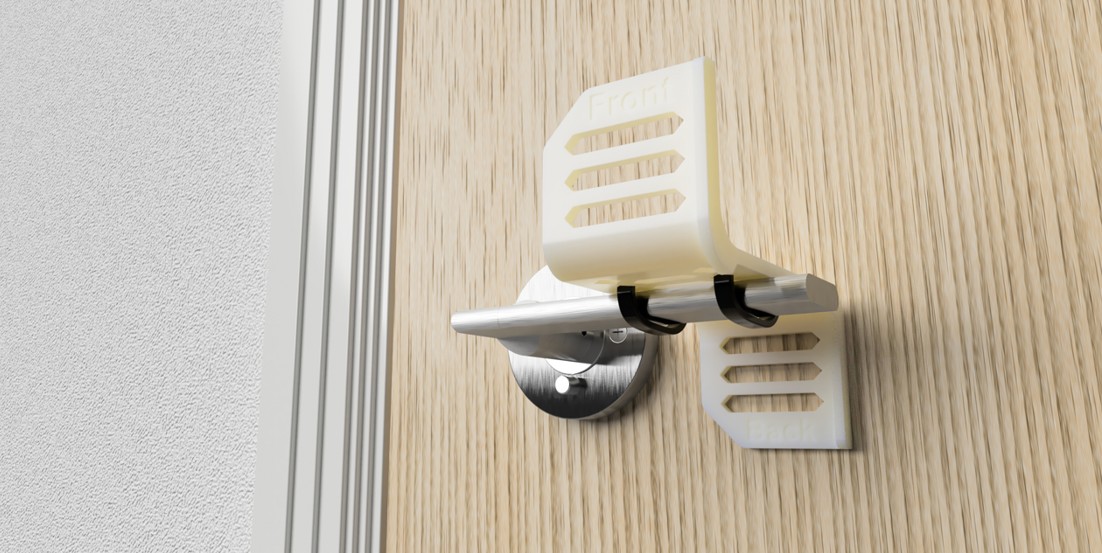
The hub’s team also 3D-printed a batch of 1,200 face visors to a pre-approved design for the Northern Care Alliance NHS Group for use by clinical staff at Salford Royal Hospital in Salford, Greater Manchester.
This complements work done by Mark Binks, a Technical Officer and business management apprentice who, after beginning to laser cut face shields in his own home workshop, set up the #Shields4Manchester crowd-sourced manufacturing collective that has produced more than 50,000 face shields for health professionals.
Delivering food parcels
The catering team at Manchester Metropolitan donated a selection of food supplies to support vulnerable people in the community through the COVID-19 crisis.
Eight van-loads of unused goods from the University’s catering outlets, such as bottled and canned drinks and smoothies, chocolate bars, biscuits, popcorn, and cereal bars, along with many other items, were sent to three food banks in the community.
The charities included Manchester South Central Food Bank in Hulme, Compassion Food Bank in Moss Side, and Cornerstone Day Centre, Manchester, which provides services to vulnerable adults.
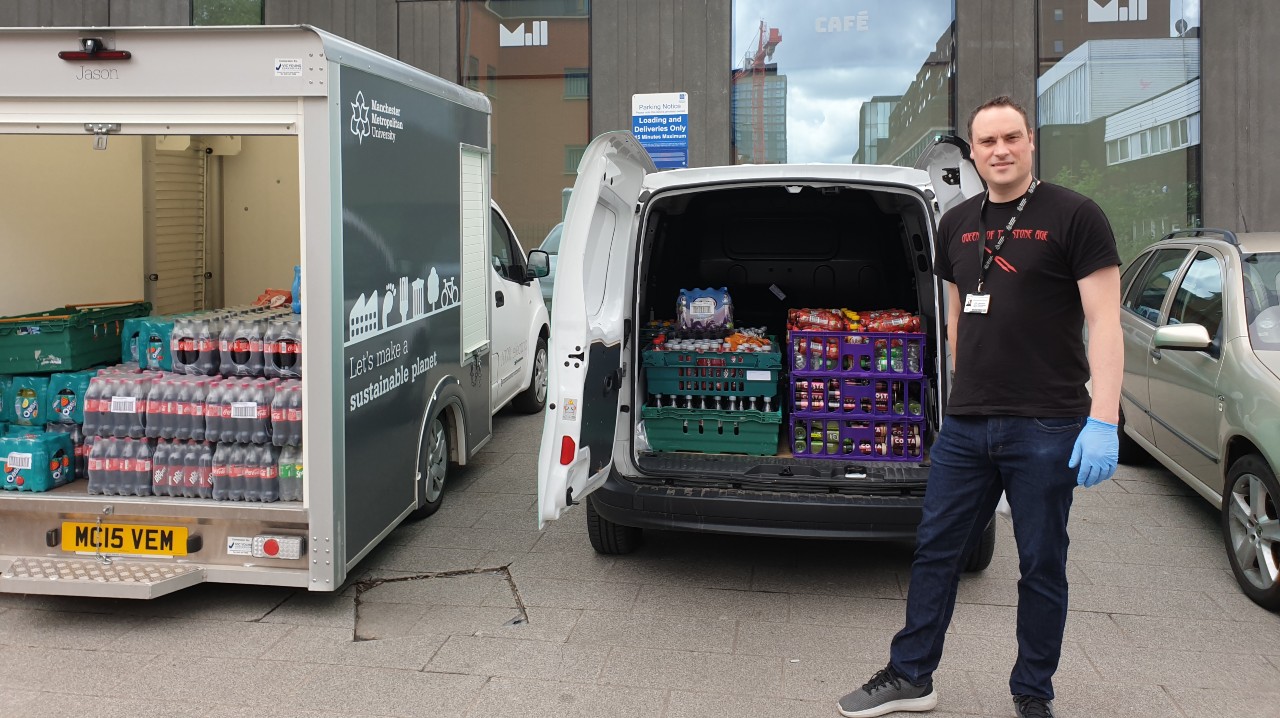
Manchester Metropolitan security staff who were working on campus and those students who were still living in halls of residence also received a package of food.
Josie Sykes, Community Engagement Manager at Manchester Met, said: “We’ve been reaching out to see how the University can work with our community partners to support local people during the pandemic.”
Poetry to raise spirits
Former Poet Laureate Carol Ann Duffy led the Manchester Writing School in developing an international poetry project called WRITE where we are NOW aimed at capturing reflections on the pandemic.
Duffy was joined by Queen’s Gold Medal winners Gillian Allnutt, Imtiaz Dharker and Gillian Clarke; exciting younger talents Raymond Antrobus and Andrew McMillan; household names Roger McGough and Ian McMillan, and dozens of other renowned and emerging poets in sharing new work inspired by the seismic events of 2020.
At times of crisis and turbulence like these we turn to the heightened language and alphabet music of poetry because poetry can help to articulate the vortex we find ourselves spinning in.
Each work reflected on the writer’s own personal experiences of the COVID-19 outbreak from all over the world, supporting readers in reflecting on and articulating their own feelings through the power of poetry.
Ian McMillan said: “At times of crisis and turbulence like these we turn to the heightened language and alphabet music of poetry because poetry can help to articulate the vortex we find ourselves
spinning in."
Support for testing trials
The University supported a national programme assessing the accuracy and ease-of-use of COVID-19 antibody hometesting kits.
Manchester Metropolitan was the North West regional partner of the programme – REal-time Assessment of Community Transmission (REACT-2) – led by Imperial College London. Up to 5,000 key workers trialled the self-test kits in controlled testing centres across the country, with the North West centre set up on Manchester Metropolitan’s campus.
Manchester Metropolitan University has an excellent track record of delivering applied health research that makes significant impact on improving the lives of those who live and work in Greater Manchester.
The University tested approximately 850 participants, including key workers such as police officers, to help develop the kits to allow a clearer picture of how far the virus had spread and what proportion of the population had been infected.
Bill Ollier, Professor of Life Sciences at Manchester Metropolitan, said: “Manchester Metropolitan University has an excellent track record of delivering applied health research that makes significant impact on improving the lives of those who live and work in Greater Manchester.”
Designing medical scrubs
The Technical Team at the University’s Manchester Fashion Institute built a digital design template to help mass produce much-needed scrubs for healthcare workers treating COVID-19 patients.
This led to an innovative partnership with the Public Sector Prison Industries (PSPI) to ensure the mass manufacture of the vital medical garments for a North West NHS trust that was experiencing shortages.
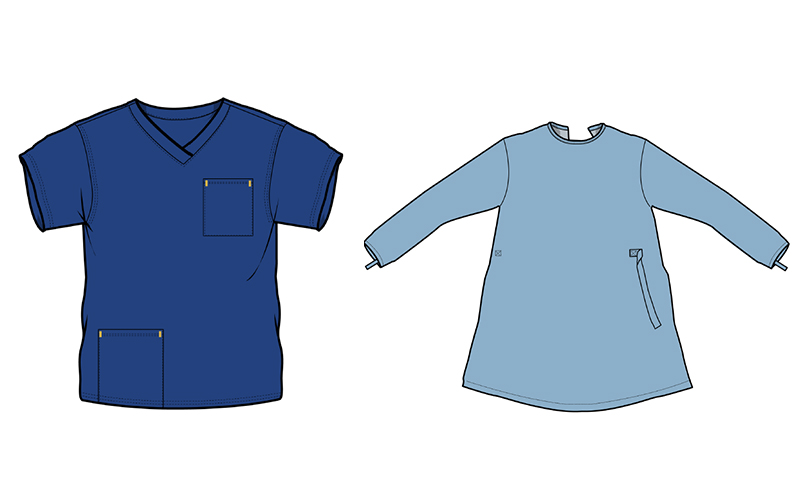
After being sent samples of existing medical garments, the Fashion Institute’s Garment Technical Services Team simplified the design to allow scrubs and gowns to be produced at scale quickly by suitable manufacturers.
The number of garment components was reduced, and the team used colour-contrast stitching for different sizes, enabling medical staff to easily find appropriate clothing on shift.
The partnership resulted in the prison workshops producing thousands of medical scrubs, based on an open source digital design template, built and made freely available to download by the MFI Technical Team.
